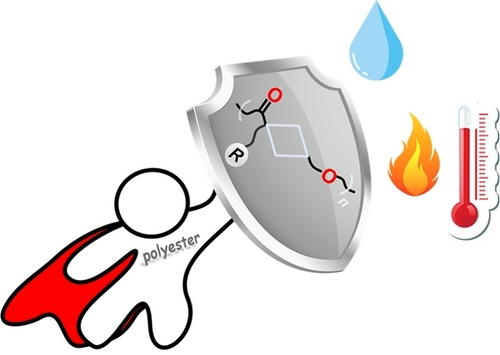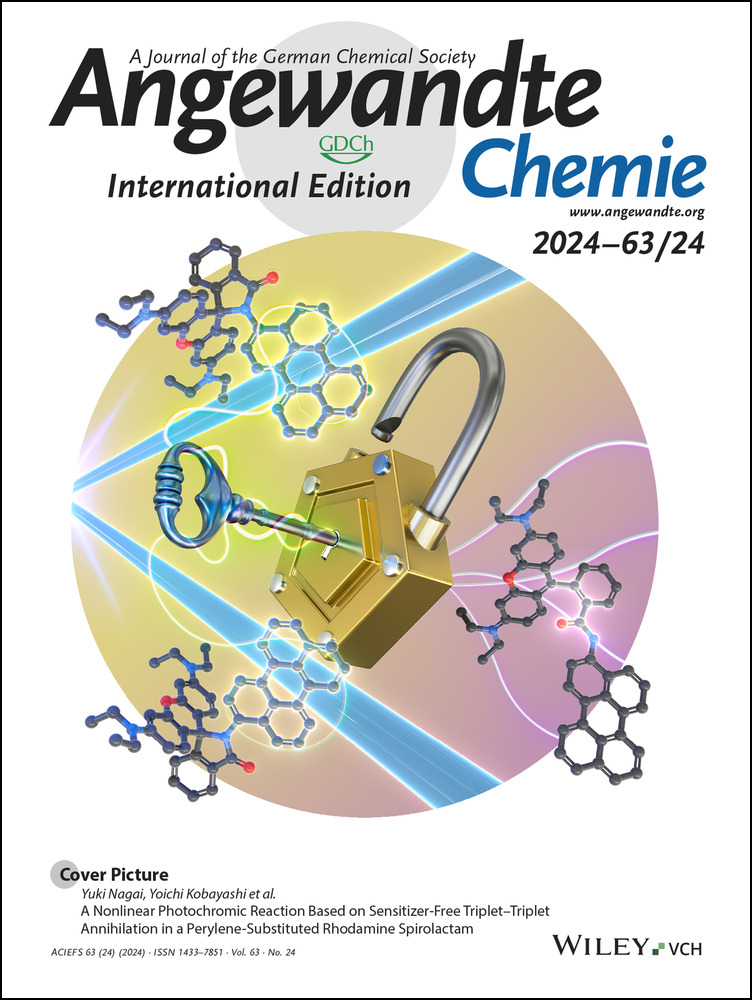Achieving Exceptional Thermal and Hydrolytic Resistance in Chemically Circular Polyesters via In-Chain 1,3-Cyclobutane Rings
Chaoqun Weng
Beijing National Laboratory for Molecular Sciences, Key Laboratory of Polymer Chemistry and Physics of Ministry of Education, Center for Soft Matter Science and Engineering, College of Chemistry and Molecular Engineering, Peking University, Beijing, 100871 China
Search for more papers by this authorZhiqiang Ding
Tianjin Key Laboratory of Composite & Functional Materials, School of Materials Science and Engineering, Tianjin University, Tianjin, 300350 China
Search for more papers by this authorWeijie Qiu
Beijing National Laboratory for Molecular Sciences, Key Laboratory of Polymer Chemistry and Physics of Ministry of Education, Center for Soft Matter Science and Engineering, College of Chemistry and Molecular Engineering, Peking University, Beijing, 100871 China
Search for more papers by this authorProf. Dr. Bin Wang
Tianjin Key Laboratory of Composite & Functional Materials, School of Materials Science and Engineering, Tianjin University, Tianjin, 300350 China
Search for more papers by this authorCorresponding Author
Prof. Dr. Xiaoyan Tang
Beijing National Laboratory for Molecular Sciences, Key Laboratory of Polymer Chemistry and Physics of Ministry of Education, Center for Soft Matter Science and Engineering, College of Chemistry and Molecular Engineering, Peking University, Beijing, 100871 China
Search for more papers by this authorChaoqun Weng
Beijing National Laboratory for Molecular Sciences, Key Laboratory of Polymer Chemistry and Physics of Ministry of Education, Center for Soft Matter Science and Engineering, College of Chemistry and Molecular Engineering, Peking University, Beijing, 100871 China
Search for more papers by this authorZhiqiang Ding
Tianjin Key Laboratory of Composite & Functional Materials, School of Materials Science and Engineering, Tianjin University, Tianjin, 300350 China
Search for more papers by this authorWeijie Qiu
Beijing National Laboratory for Molecular Sciences, Key Laboratory of Polymer Chemistry and Physics of Ministry of Education, Center for Soft Matter Science and Engineering, College of Chemistry and Molecular Engineering, Peking University, Beijing, 100871 China
Search for more papers by this authorProf. Dr. Bin Wang
Tianjin Key Laboratory of Composite & Functional Materials, School of Materials Science and Engineering, Tianjin University, Tianjin, 300350 China
Search for more papers by this authorCorresponding Author
Prof. Dr. Xiaoyan Tang
Beijing National Laboratory for Molecular Sciences, Key Laboratory of Polymer Chemistry and Physics of Ministry of Education, Center for Soft Matter Science and Engineering, College of Chemistry and Molecular Engineering, Peking University, Beijing, 100871 China
Search for more papers by this authorGraphical Abstract
Polyesters P(4R-BL) (R=Ph, Bu), with 1,3-cyclobutane rings in the backbone, have been developed to demonstrate exceptional thermal stability (Td,5%=376–380 °C) and resistance to hydrolysis (intact in pH 0–14). Distinguished from classic polyesters, they exhibit good chemical circularity and offer adjustable material performances comparable to those of non-degradable syndiotactic polystyrene and low-density polyethylene.
Abstract
Polyesters, a highly promising class of circular polymers for achieving a closed-loop sustainable plastic economy, inherently exhibit material stability defects, especially in thermal and hydrolytic instability. Here, we introduce a class of polyesters, P(4R-BL) (R=Ph, Bu), featuring conformationally rigid 1,3-cyclobutane rings in the backbone. These polyesters not only exhibit superior thermostability (Td,5%=376–380 °C) but also demonstrate exceptional hydrolytic resistance with good integrity even after 1 year in basic and acidic aqueous solutions, distinguishing themselves from typical counterparts. Tailoring the flexibility of the side group R enables the controlled thermal and mechanical performance of P(4Ph-BL) and P(4Bu-BL) to rival durable syndiotactic polystyrene (SPS) and low-density polyethylene (LDPE), respectively. Significantly, despite their high stability, both polyesters can be effectively depolymerized into pristine monomers, establishing a circular life cycle.
Supporting Information
As a service to our authors and readers, this journal provides supporting information supplied by the authors. Such materials are peer reviewed and may be re-organized for online delivery, but are not copy-edited or typeset. Technical support issues arising from supporting information (other than missing files) should be addressed to the authors.
| Filename | Description |
|---|---|
| anie202401682-sup-0001-misc_information.pdf13.9 MB | Supporting Information |
Please note: The publisher is not responsible for the content or functionality of any supporting information supplied by the authors. Any queries (other than missing content) should be directed to the corresponding author for the article.
References
- 1
- 1aPlastic Europe, 2022, https://plasticseurope.org/knowledge-hub/plastics-the-facts-2022/;
- 1bS. B. Borrelle, J. Ringma, K. L. Law, C. C. Monnahan, L. Lebreton, A. McGivern, E. Murphy, J. Jambeck, G. H. Leonard, M. A. Hilleary, M. Eriksen, H. P. Possingham, H. De Frond, L. R. Gerber, B. Polidoro, A. Tahir, M. Bernard, N. Mallos, M. Barnes, C. M. Rochman, Science 2020, 369, 1515–1518;
- 1cR. G. Santos, G. E. Machovsky-Capuska, R. Andrades, Science 2021, 373, 56–60;
- 1dM. MacLeod, H. P. H. Arp, M. B. Tekman, A. Jahnke, Science 2021, 373, 61–65;
- 1eW. Tian, P. Song, H. Zhang, X. Duan, Y. Wei, H. Wang, S. Wang, Prog. Mater. Sci. 2023, 132, 101035.
- 2
- 2aM. Hong, E. Y.-X. Chen, Green Chem. 2017, 19, 3692–3706;
- 2bX.-B. Lu, Y. Liu, H. Zhou, Chem. Eur. J. 2018, 24, 11255–11266;
- 2cG. W. Coates, Y. D. Y. L. Getzler, Nat. Rev. Mater. 2020, 5, 501–516;
- 2dJ. C. Worch, A. P. Dove, ACS Macro Lett. 2020, 9, 1494–1506;
- 2eX. Tang, E. Y.-X. Chen, Chem 2019, 5, 284–312;
- 2fC. M. Plummer, L. Li, Y. Chen, Macromolecules 2023, 56, 731–750;
- 2gW. Xiong, H. Lu, Sci. China Chem. 2023, 66, 725–738;
- 2hD. E. Fagnani, J. L. Tami, G. Copley, M. N. Clemons, Y. D. Y. L. Getzler, A. J. McNeil, ACS Macro Lett. 2021, 10, 41–53;
- 2iX.-L. Li, K. Ma, F. Xu, T.-Q. Xu, Chem. Asian J. 2023, 18, e202201167;
- 2jG. Xu, Q. Wang, Green Chem. 2022, 24, 2321–2346;
- 2kC. Shi, L. T. Reilly, E. Y. X. Chen, Angew. Chem. Int. Ed. 2023, 62, e202301850.
- 3
- 3aM. Hong, E. Y.-X. Chen, Nat. Chem. 2016, 8, 42–49;
- 3bM. Hong, E. Y.-X. Chen, Angew. Chem. Int. Ed. 2016, 55, 4188–4193;
- 3cN. Zhao, C. Ren, H. Li, Y. Li, S. Liu, Z. Li, Angew. Chem. Int. Ed. 2017, 56, 12987–12990;
- 3dC.-J. Zhang, L.-F. Hu, H.-L. Wu, X.-H. Cao, X.-H. Zhang, Macromolecules 2018, 51, 8705–8711;
- 3eL. Lin, D. Han, J. Qin, S. Wang, M. Xiao, L. Sun, Y. Meng, Macromolecules 2018, 51, 9317–9322;
- 3fY. Shen, Z. Zhao, Y. Li, S. Liu, F. Liu, Z. Li, Polym. Chem. 2019, 10, 1231–1237.
- 4
- 4aC. Weng, X. Tang, Chin. J. Chem. 2023, 41, 1603–1607;
- 4bJ.-B. Zhu, E. Y.-X. Chen, Angew. Chem. Int. Ed. 2018, 57, 12558–12562;
- 4cY.-T. Li, H.-Y. Yu, W.-B. Li, Y. Liu, X.-B. Lu, Macromolecules 2021, 54, 4641–4648;
- 4dC. Shi, R. W. Clarke, M. L. McGraw, E. Y.-X. Chen, J. Am. Chem. Soc. 2022, 144, 2264–2275;
- 4eJ.-B. Zhu, E. M. Watson, J. Tang, E. Y.-X. Chen, Science 2018, 360, 398–403;
- 4fC. Shi, Z.-C. Li, L. Caporaso, L. Cavallo, L. Falivene, E. Y.-X. Chen, Chem 2021, 7, 670–685;
- 4gY.-M. Tu, X.-M. Wang, X. Yang, H.-Z. Fan, F.-L. Gong, Z. Cai, J.-B. Zhu, J. Am. Chem. Soc. 2021, 143, 20591–20597;
- 4hH.-Z. Fan, X. Yang, Y.-C. Wu, Q. Cao, Z. Cai, J.-B. Zhu, Polym. Chem. 2023, 14, 747–753;
- 4iX.-M. Wang, H.-Y. Huang, Y.-M. Tu, Z. Cai, J.-B. Zhu, Polym. Chem. 2023, 14, 2027–2033;
- 4jT. Zhou, Y.-T. Guo, F.-S. Du, Z.-C. Li, Chin. J. Polym. Sci. 2022, 40, 1173–1182;
- 4kC. Li, L. Wang, Q. Yan, F. Liu, Y. Shen, Z. Li, Angew. Chem. Int. Ed. 2022, 61, e202201407;
- 4lJ. Bruckmoser, S. Remke, B. Rieger, ACS Macro Lett. 2022, 11, 1162–1166;
- 4mX.-L. Li, R. W. Clarke, H.-Y. An, R. R. Gowda, J.-Y. Jiang, T.-Q. Xu, E. Y. X. Chen, Angew. Chem. Int. Ed. 2023, 62, e202303791;
- 4nX.-L. Li, R. W. Clarke, J.-Y. Jiang, T.-Q. Xu, E. Y. X. Chen, Nat. Chem. 2023, 15, 278–285;
- 4oL. Zhou, Z. Zhang, C. Shi, M. Scoti, D. K. Barange, R. R. Gowda, E. Y.-X. Chen, Science 2023, 380, 64–69.
- 5
- 5aH. Abe, Macromol. Biosci. 2006, 6, 469–486;
- 5bX. Tang, E. Y.-X. Chen, Nat. Commun. 2018, 9, 2345.
- 6
- 6aW.-K. Lee, J. A. Gardella, Langmuir 2000, 16, 3401–3406;
- 6bH. Tsuji, K. Ikarashi, Polym. Degrad. Stab. 2004, 85, 647–656;
- 6cJ. P. Brutman, G. X. De Hoe, D. K. Schneiderman, T. N. Le, M. A. Hillmyer, Ind. Eng. Chem. Res. 2016, 55, 11097–11106;
- 6dX. Tang, M. Hong, L. Falivene, L. Caporaso, L. Cavallo, E. Y.-X. Chen, J. Am. Chem. Soc. 2016, 138, 14326–14337;
- 6eM. Hong, X. Tang, B. S. Newell, E. Y.-X. Chen, Macromolecules 2017, 50, 8469–8479;
- 6fH. J. Kim, Y. Reddi, C. J. Cramer, M. A. Hillmyer, C. J. Ellison, ACS Macro Lett. 2020, 9, 96–102;
- 6gG. W. Fahnhorst, G. X. De Hoe, M. A. Hillmyer, T. R. Hoye, Macromolecules 2020, 53, 3194–3201;
- 6hJ. Yuan, D. Shi, Y. Zhang, J. Lu, L. Wang, E.-Q. Chen, H. Lu, CCS Chem. 2020, 2, 236–244;
- 6iM.-Q. Li, Z.-X. Luo, X.-Y. Yu, G.-Q. Tian, G. Wu, S.-C. Chen, Y.-Z. Wang, Macromolecules 2023, 56, 2465–2475.
- 7
- 7aJ. Yu, D. Plackett, L. X. L. Chen, Polym. Degrad. Stab. 2005, 89, 289–299;
- 7bA. Dhaini, V. Hardouin-Duparc, A. Alaaeddine, J.-F. Carpentier, S. M. Guillaume, Prog. Polym. Sci. 2024, 149, 101781.
- 8H. K. Hall, E. P. Blanchard, E. L. Martin, Macromolecules 1971, 4, 142–146.
- 9
- 9aJ.-F. Carpentier, Organometallics 2015, 34, 4175–4189;
- 9bA. Amgoune, C. M. Thomas, S. Ilinca, T. Roisnel, J.-F. Carpentier, Angew. Chem. Int. Ed. 2006, 45, 2782–2784;
- 9cA. Amgoune, C. M. Thomas, T. Roisnel, J.-F. Carpentier, Chem. Eur. J. 2006, 12, 169–179.
- 10M. Cheng, A. B. Attygalle, E. B. Lobkovsky, G. W. Coates, J. Am. Chem. Soc. 1999, 121, 11583–11584.
- 11H. Abe, N. Takahashi, K. J. Kim, M. Mochizuki, Y. Doi, Biomacromolecules 2004, 5, 1480–1488.
- 12J. D. Peterson, S. Vyazovkin, C. A. Wight, Macromol. Chem. Phys. 2001, 202, 775–784.
- 13Idemitsu Kosan Co.,Ltd., https://www.idemitsu.com/en/business/ipc/engineering/polystyrene.html.
- 14Idemitsu Kosan Co.,Ltd., https://www.idemitsu.com/en/business/ipc/engineering/grade/grade sps/series sp/index.html.
- 15
- 15aA. J. Teator, F. A. Leibfarth, Science 2019, 363, 1439–1443;
- 15bR. M. Cywar, N. A. Rorrer, C. B. Hoyt, G. T. Beckham, E. Y. X. Chen, Nat. Rev. Mater. 2022, 7, 83–103.





